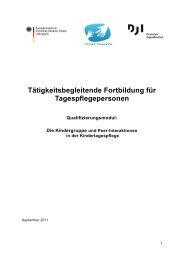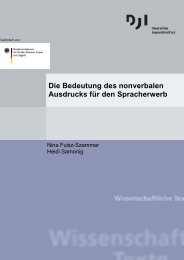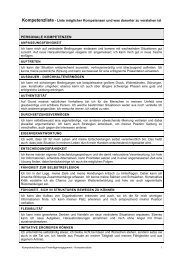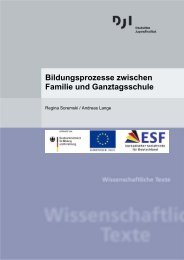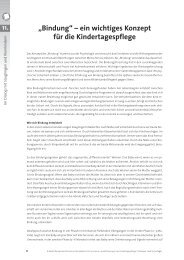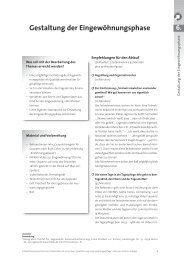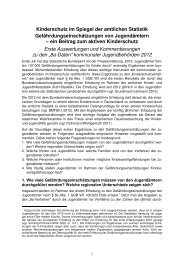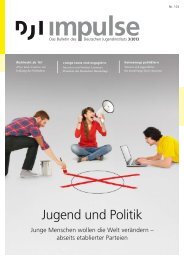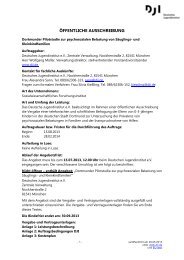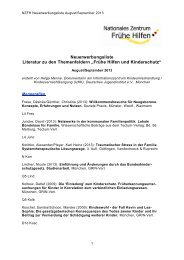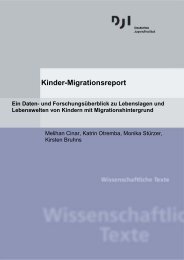download - Deutsches Jugendinstitut e.V.
download - Deutsches Jugendinstitut e.V.
download - Deutsches Jugendinstitut e.V.
You also want an ePaper? Increase the reach of your titles
YUMPU automatically turns print PDFs into web optimized ePapers that Google loves.
S (Strengths)• Effective approach on the part<br />
of the intermediary bodies in the selection and<br />
accompaniment of addressees • The<br />
addressees’ organisation structures and project<br />
competences are strengthened.<br />
• Experimentation with new integration<br />
instruments (vouchers, financial support for<br />
membership in social cooperatives, etc.).<br />
• The target groups and addressees continue to<br />
be registered and diversified.<br />
• Flexibility of implemented measures;<br />
possibility at all times of corrective<br />
intervention during projects.<br />
• Sensitisation and activation on a local level.<br />
T (Threats)• The extent of the medium-term<br />
sustainability of new jobs created (or new<br />
businesses or business areas) cannot as yet be<br />
evaluated.<br />
• Risks from the aspect of formation of<br />
intermediary bodies: possible pursuit of<br />
individual interests!<br />
• The transition of the target group from<br />
beneficiary to active “co-protagonists” who are<br />
integrated into the social cooperatives/smallsized<br />
businesses continues to be hindered by<br />
organisational and cognitive obstacles.<br />
W (Weaknesses)• Integration (or at least<br />
harmonisation) of programme measures in<br />
local social and labour policy measures is<br />
necessary.<br />
• Possible overlapping of other social and<br />
labour policy measures.<br />
• Lack of further financing possibilities other<br />
than through the ESF.<br />
• Activities related to the development of<br />
organisations appear to meet with greater<br />
success than the creation of small-sized<br />
businesses and new jobs.<br />
O (Opportunities)<br />
• Favourable transferability of organisation<br />
model of the intermediary bodies to local<br />
integration processes for the improved<br />
adjustment of services for social and<br />
professional integration to supply and<br />
demand.<br />
• Successful model of intermediary bodies as<br />
“local antennae” that can recognise local<br />
needs, respond to these and support relevant<br />
innovative projects.<br />
• In addition to professional integration, the<br />
addressees learn to utilise new methods and<br />
instruments which can be employed for future<br />
activities concerned with social and<br />
professional integration.<br />
The complete study is available from TECNOSTRUTTURA, Via Volturno 58, 00185<br />
Roma, Italia, Tel. 0039-(0)6-49270501, Fax 0039-(0)6-492705108, E-Mail<br />
stampasegreteria@tecnostruttura.it<br />
Implementation in the region of Piedmont<br />
The region of Piedmont aims to utilise the “small grants” for the social and professional<br />
integration of disadvantaged persons.<br />
The intermediary body Union.Etica is a temporary merger of the two organisations<br />
Banca Popolare Etica (credit union) and Unionfidi S.C. Unionfidi S.C. is a non-profitable<br />
cooperative which supports small- and medium-sized businesses through performance<br />
guarantees and consultancy services for management and financial issues. The task of the<br />
intermediary body is to publicise the programme, carry out the application procedure,<br />
advise (potential) project supporters (advice on application and financial technical<br />
problems), the accompaniment of project implementation and project monitoring and<br />
78



